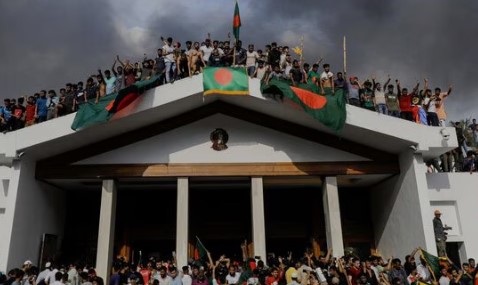The recent dramatic escape of Bangladesh’s former Prime Minister Sheikh Hasina by helicopter highlights the nation’s long history of political upheaval. Since its independence over 50 years ago, the nation has experienced numerous leaders fleeing or having their terms abruptly ended due to violence.
1975: A Year of Assassinations and Coups
Following the independence war of 1971, Sheikh Mujibur Rahman, the country’s first prime minister and a pivotal figure in the independence movement, was assassinated along with his family on August 15, 1975. This act of violence, carried out by a faction of the military, led to Khondaker Mostaq Ahmad seizing power. Ahmad’s rule was short-lived as he was overthrown by Army Chief Khaled Mosharraf on November 3. Mosharraf was then assassinated by rival mutineers, leading to a series of coups before General Ziaur Rahman took control on November 7.
1981-1983: From Bloody Rebellion to a Bloodless Coup
General Ziaur Rahman’s tenure ended abruptly when he was assassinated during an attempted revolt on May 30, 1981. His vice-president Abdus Sattar briefly became interim president with the support of General Hussain Muhammad Ershad. However, Ershad orchestrated a bloodless coup on March 24, 1982, ousting Sattar. Ershad imposed martial law and installed Ahsanuddin Chowdhury as president, only to declare himself head of State on December 11, 1983.
1990: Ershad’s Resignation Amidst Protests
Protests demanding democratic reforms led to Ershad’s resignation on December 6, 1990. He was arrested and convicted of corruption on December 12. Justice Minister Shahabuddin Ahmed assumed interim leadership until elections were held the following year. Ershad was released in January 1997.
1991: The Era of Free Elections
The first free elections in early 1991 saw the Bangladesh Nationalist Party (BNP) win, with Khaleda Zia, the widow of General Ziaur Rahman, becoming the first female prime minister. She was succeeded by Sheikh Hasina, daughter of Mujibur Rahman, after the Awami League defeated the BNP in 1996. The BNP returned to power in 2001, with Zia resuming the role of prime minister until October 2006.
2007: An Anti-Corruption Crackdown
A state of emergency was declared by President Iajuddin Ahmed in 2007 amid anti-government demonstrations. A military-led transitional government then conducted an anti-corruption campaign, imprisoning both Hasina and Zia on graft charges. Following their release in 2008, Hasina’s party won the election, allowing her to return as prime minister.

















